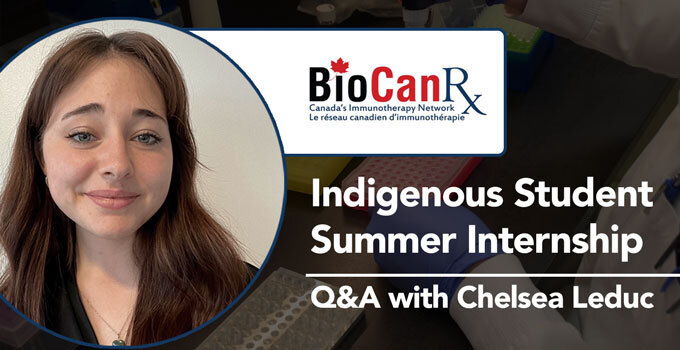OICR sponsored fourth-year undergrad Chelsea Leduc to study in a molecular biology lab through the 2025 BioCanRx Indigenous Summer Student Internship.
It was during the summer after Chelsea Leduc’s first year of university at the University of Ottawa that she discovered her interest in science went beyond math and physics.
She spent that summer volunteering at a cancer centre in her hometown of Sudbury. Inspired by the cancer patients she met, she decided to switch programs from chemical engineering to biomedical science.
“Being around patients and understanding their experiences really motivated me to want to pursue a career in medical science,” Leduc says.
Now, a few years later, another summer experience has shown Leduc she is on the right track.
OICR sponsored Leduc for the 2025 BioCanRx Indigenous Summer Student Internship, a collaboration between OICR, BioCanRx and the Canadian Cancer Society that provides Indigenous students with hands-on research or policy experience.
Leduc interned in the lab of Dr. Sujeenthar Tharmalingam at the Northern Ontario School of Medicine, where she contributed to molecular biology research about radiation resistance in triple-negative breast cancer.
“This summer confirmed how much I really enjoy research, and reaffirmed this is the path I want to go down,” says Leduc, who is now entering her fourth year of undergraduate studies.
OICR News asked Leduc about her experiences during her internship and her plans for the future.
How was your experience in Dr. Tharmalingam’s lab?
It was a great experience. My supervisor was very helpful and supportive — we talked about my goals and tailored my experience to work toward them.
During the internship, I got the opportunity to study the mechanisms that underly resistance to radiation in triple negative breast cancer, and in particular to validate genes that had previously been identified as potentially related to radiation resistance. Through this and other work, I was able to contribute to an academic paper in progress, and get a lot of valuable experience.
What were the most interesting aspects of cancer research you learned about during your internship?
Some of the most interesting things for me were fundamental skills. For example, I really enjoyed cell culturing. You have your own set of cells to take care of, and you need to come in every single day to check on them. It made me realize that research is a lot more than coming into the lab and doing an experiment. I also did a lot of qPCR testing. I don’t even know how many plates I ran this summer, but I got pretty proficient at doing them successfully.
These are both such important skills, and they will my transition into other labs in the future much easier.
How did the internship shape your perspective on your future career path?
This internship helped me see the importance of research and how it can translate into improved to patient care, and that reinforced my interest in research as well as my interest in medicine. It also helped boost my confidence and gave me a clearer sense of direction in my career path. I’m excited by the possibilities in front of me, including a master’s degree, a PhD and even medical school.
Why are internship opportunities like this important for students?
I think they’re incredibly valuable because they give students like me the opportunity to get a taste of what research looks like outside of an undergrad lab. A career in research is a big commitment, and it’s really important to be able to experience what it’s like before making a decision on your future.

